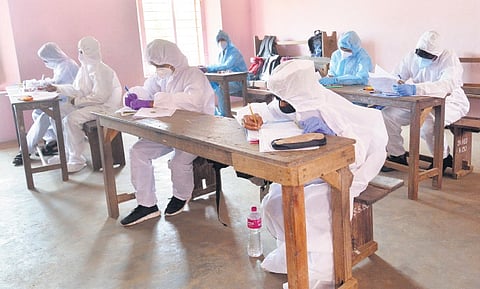

KOCHI: Pause for a moment. Close your eyes, and rewind to 2020. It was on the evening of March 11, five years ago, that the Covid-19 outbreak was declared a global pandemic.
A harrowing time when a microscopic entity brought humankind’s relentless pursuit of progress to an abrupt halt.
What began as a cluster of mysterious fever cases in Wuhan, China, soon spiralled into a devastating global crisis of unprecedented scale.
Today, people jest about having a survival story to tell future generations, yet beneath the humour lies the weight of collective loss, resilience, and reckoning.
Five years have passed in a jiffy, right? And we find ourselves slipping back into familiar patterns. Should we?
If the pandemic taught us anything, it was the fragility of life, the power of community, and the need to pause, reflect, and cherish the ordinary moments we once took for granted. Let us not forget.
A quick recap
December 31, 2019 – China alerts the WHO about cases of pneumonia of unknown cause in Wuhan, Hubei province.
January 7, 2020 – Chinese scientists identify a new coronavirus, later named SARS-CoV-2.
January 11, 2020 – China reports the first death linked to Covid-19 in Wuhan.
January 30, 2020 – WHO declares Covid-19 a public health emergency of international concern.
January 30, 2020 – India reports its first confirmed Covid-19 case in Thrissur, a student who returned from Wuhan.
February 11, 2020- The disease officially named Covid-19.
March 11, 2020 – WHO declares Covid-19 a global pandemic.
March 12, 2020 – India reports its first Covid-19 death (a 76-year-old man in Karnataka).
March 22, 2020 – Janata Curfew to prepare for social distancing measures.
March 24, 2020 – Prime Minister Narendra Modi announces a 21-day nationwide lockdown, which is later extended multiple times.
April 4, 2020 - WHO reports that over 1 million cases of Covid-19 have been confirmed worldwide.
May 1, 2020 – India begins the Vande Bharat Mission to repatriate stranded Indians.
August 15, 2020 – India’s first indigenous vaccine, Covaxin, is announced by Bharat Biotech in collaboration with ICMR.
December 2, 2020 – The UK becomes the first country to approve a Covid-19 vaccine (Pfizer-BioNTech).
December 14, 2020 – The first Covid-19 vaccination is administered in the UK to a 90-year-old woman.
December 31, 2020 – WHO grants emergency use approval to Pfizer-BioNTech’s vaccine.
January 3, 2021 – India grants emergency use approval to Covaxin and Covishield.
January 16, 2021 – India begins its Covid-19 vaccination drive, prioritising healthcare and frontline workers.
March 1, 2021 – Vaccination expands to senior citizens (60+) and those with comorbidities (45+).
May 1, 2021 – Vaccination eligibility opens for all adults (18+).
June 21, 2021 – India administers a record 8.6 million vaccine doses in a single day.
October 21, 2021 – India crosses 1 billion vaccine doses
November 26, 2021- WHO declares Omicron as variant of concern.
December 2021 – The Omicron variant (B.1.1.529) is detected in India.
January 3, 2022 – India starts vaccinating teenagers aged 15–18.
January 10, 2022 – India begins booster (precautionary) doses for frontline workers and senior citizens.
January 20, 2022 – Peak of the third wave.
March 2022 – Cases decline, and restrictions are gradually lifted.
April 10, 2022 – Booster doses expanded to all adults.
March 31, 2022- India lifts all covid restrictions, except masks.
July 17, 2022 – India surpasses 2 billion vaccine doses administered.
May 5, 2023 – WHO declares that Covid-19 is no longer a global health emergency, confirming the pandemic’s end.
70,90,776 Total global deaths: (an increase of 517 over the past week. Source: WHO)
5,33,664 Total number of deaths in India as of March 10, 2025: There are 6 active cases in the country. (Source: Union health ministry dashboard)
72,139 Covid-19 deaths in Kerala: (Union health ministry dashboard)
8,526 Ernakulam